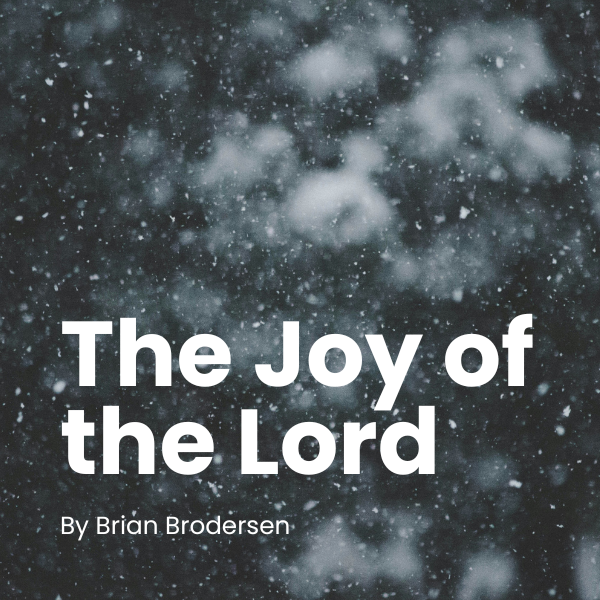
We all know that Joy is one of the great themes of Christmas, and perhaps you’ve recently (this past Christmas season) heard a sermon or even engaged in singing a song about joy. The one that comes most naturally to my mind (probably because I’ve heard it my whole life) is “Joy to the World.” You probably know the lyrics by heart: “Joy to the world; The Lord has come; / Let Earth receive her King; / Let ev’ry heart prepare him room, / and heav’n and nature sing …” The funny thing about that song is that it wasn’t written for Christmas, which, of course, celebrates the first coming of Christ, but rather, the song anticipates the second coming of Christ when “He rules the world with truth and grace …” Then, perpetual joy will be the air we breathe, and it’s for that day we long. But until then, are we limited to just a few days out of the year to expect joy? No. As God’s people, joy is an aspect of our inheritance. As a Christian, you’re born of the Spirit, indwelt by the Spirit, and a partaker of the fruit of the Spirit, which is, among other things, Joy. What a blessing to know that joy is available to us continually through the presence of the Spirit in our lives.
But what is joy? It seems that joy is one of those things you know when you’re experiencing it, but it’s difficult to define. In the New Testament, the Greek word chara is translated as joy; that word is also translated as gladness, cheerfulness, and delight. An English dictionary defines joy as a feeling of “peace, contentment, happiness, and delight.” That sounds about right, but some would argue that happiness and joy are different. Happiness, they say, is a more conscious appraisal of how we feel over time, dependent on a range of external factors. I do agree that happiness is generally contingent upon circumstances. In reading up on joy, I found, believe it or not, a scientific definition. Here it is. “Joy has been described as an intense, internal experience of positive emotion accessed in small moments: smiling, laughing, jumping for joy.” Funny enough, the scientific definition resonated with me most.
Lately, there are two things in my life that have resulted in the experience described in the scientific definition of joy: my four-year-old grandson (who’s living with us right now) and his cat — Batman, whom he named. Remi, my grandson who has to be one of the brightest four-year-olds ever, will come up with questions or comments or even sayings that will instantly put the biggest smile on my face and fill me with feelings of delight. A couple of weeks ago, Cheryl and I drove him through some of the neighborhoods near our house to look at the Christmas lights; kids love to look at Christmas lights. As we drove along one block, Remi suddenly commented that the people in that neighborhood weren’t very creative. I felt the joy rising within as I wondered how in the world a four-year-old could even come up with a thought like that.
Then, there’s Batman. Our dog, Barnabas, lives to take a daily walk. When he sees us getting dressed in our walking clothes or shoes, or we happen to say the word “walk,” he goes completely nuts with excitement. At that, the cat will casually walk up and smack him on the snout, as if to say, “You’re out of control; get it together,” and then casually walk away. Between the hilarious things Remi says and the cool cat attitude of Batman, I’ve had lots of those moments of smiling and laughing lately. Lots of joy in the scientific sense and lots of thankfulness to God for such wonderful little moments.
But surely the Bible is talking about something far deeper than that when it talks about joy, isn’t it? I think so. C.S. Lewis, who used the term joy to describe his own spiritual experiences, gave his autobiography the title Surprised by Joy. In a letter to a friend, Lewis wrote: “… Joy … must be sharply distinguished from Happiness and Pleasure. Joy (in my sense) has indeed one characteristic, and one only, in common with them; the fact that anyone who has experienced it will want it again.”
Lewis believed that joy, although similar, was distinct from happiness and pleasure. I think he was right, especially when we associate joy with God, which is what the Bible bids us to do. “Rejoice in the Lord always. Again I say, rejoice!” says Paul the Apostle (Philippians 4:4). Nehemiah reminded the people of his day, “The joy of the LORD is your strength” (Nehemiah 8:10). The biblical understanding of joy is rooted in God and His eternal goodness, which is always present toward those who believe, and this is how joy and happiness are distinguished. Joy is not contingent upon outward circumstances, as is happiness, but is always available because God is, and He is always good.
As we leave behind the joyful season and enter a new year filled with uncertainties and temptations toward worry and fear, let’s remember joy can be ours all year long. Our first and greatest cause for joy is Jesus himself, who loves us with an everlasting love, who has an eternal plan and purpose for our lives, and who has promised to be with us always, even to the end of the age. As we believe that and continue to press deeper and deeper into our relationship with Him through His word and fellowship with His people, our forever family, as we worship and serve Him and live more intentionally into His story, joy will mark our path, and the joy of the Lord will be our daily strength. “For the kingdom of God is … righteousness, peace and joy in the Holy Spirit” (Romans 14:17).







